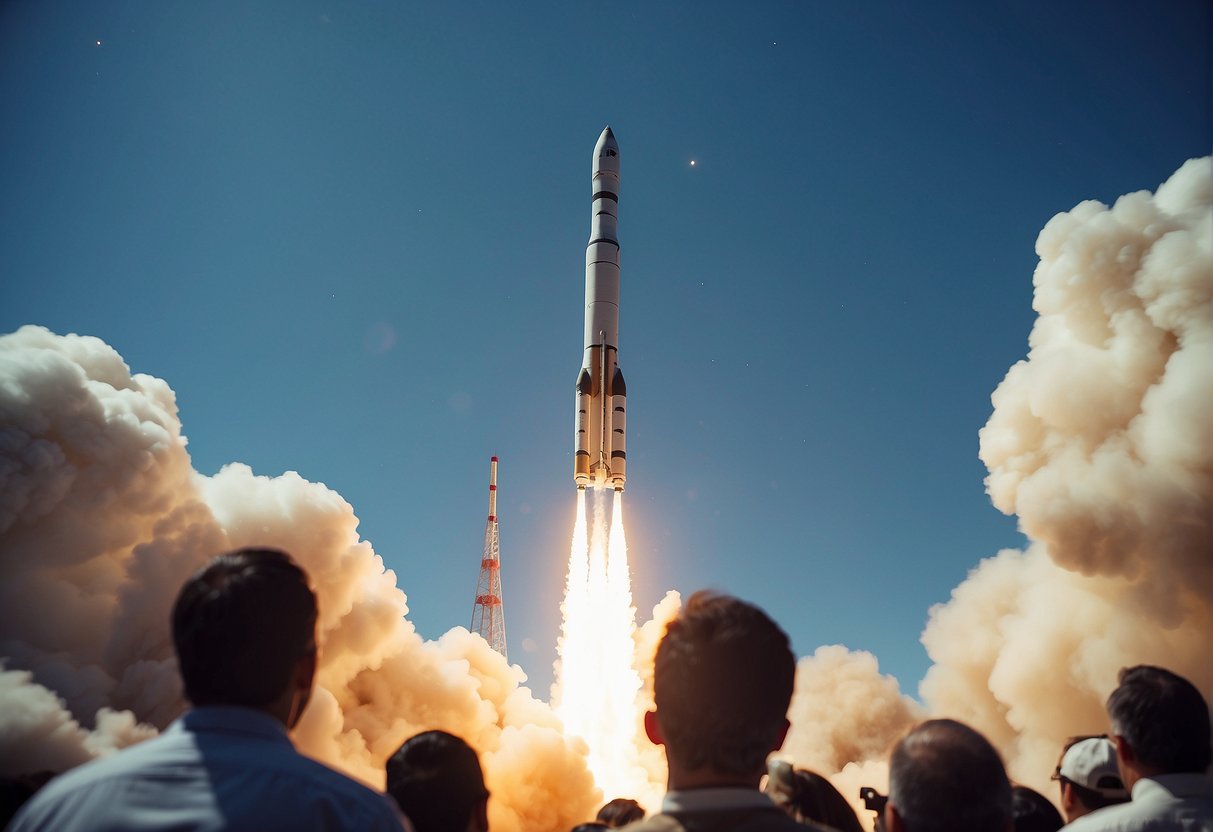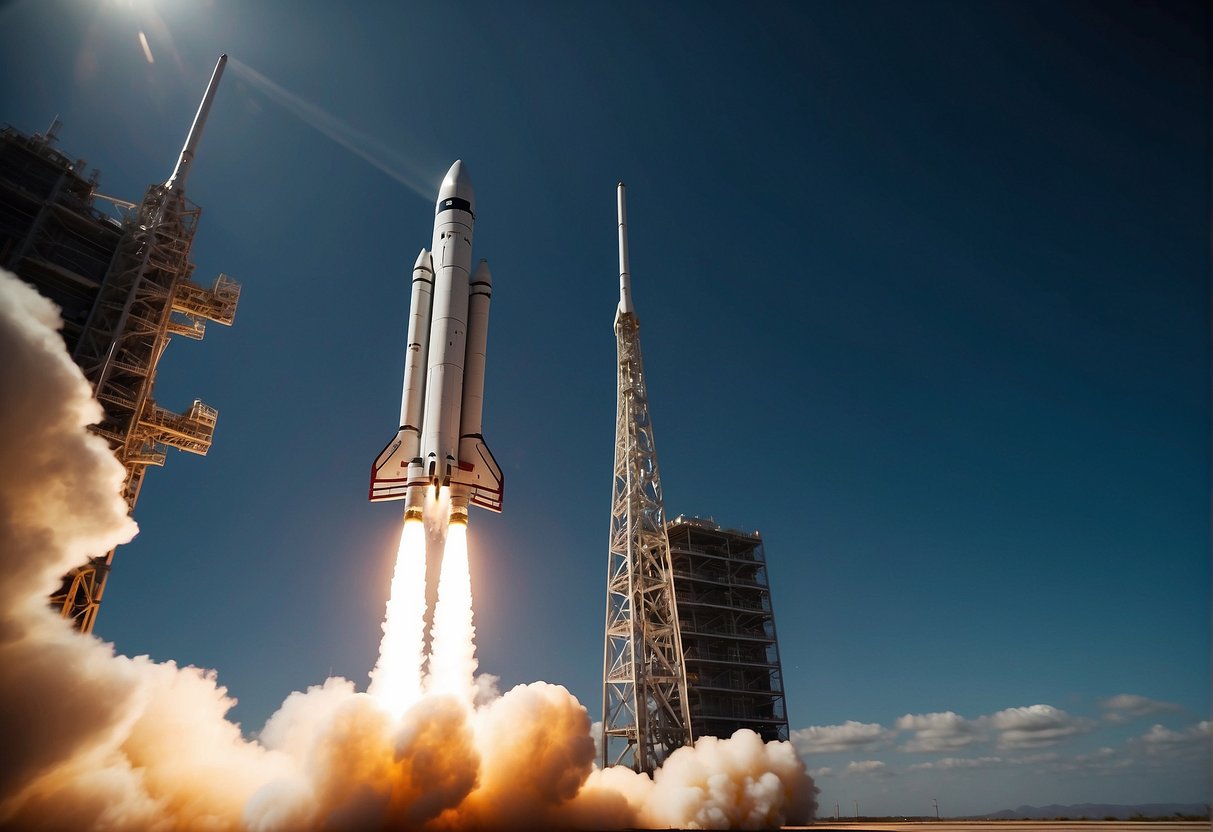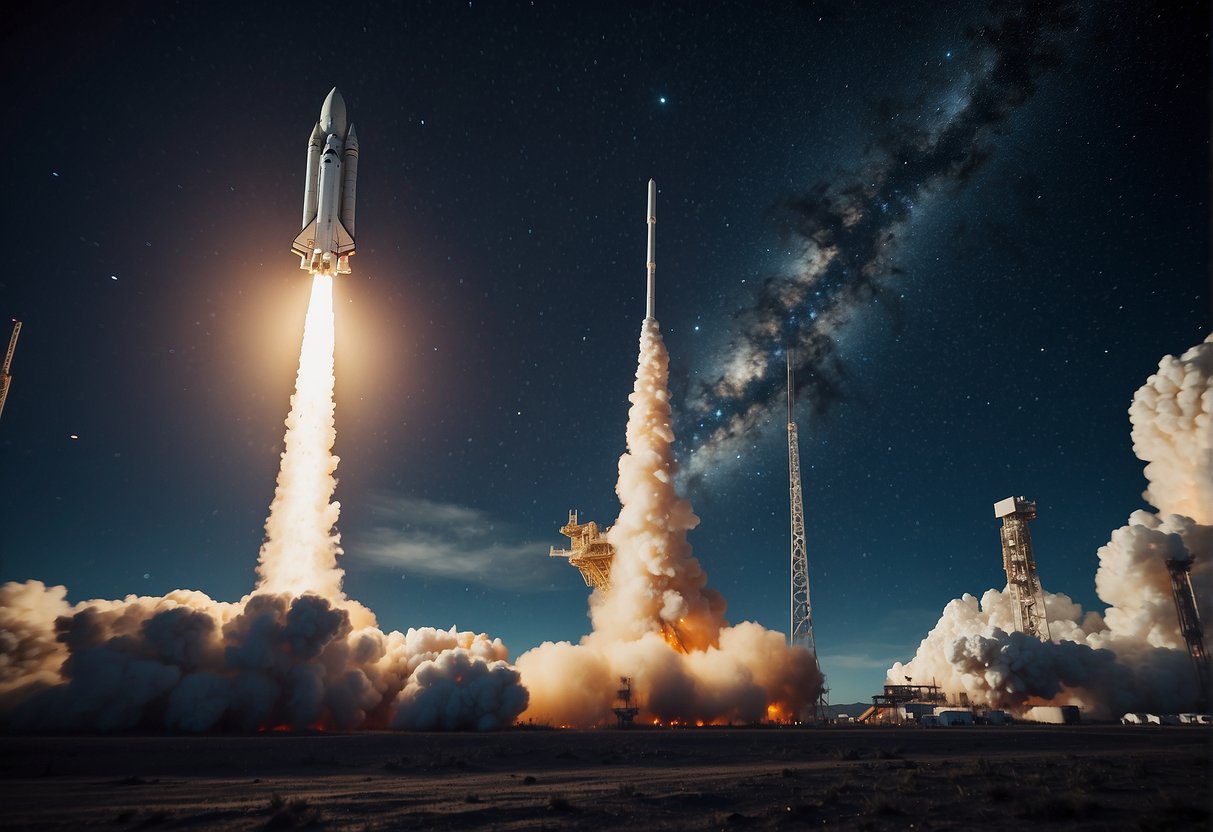
The so-called billionaire space race has become a modern spectacle of ambition and technology, with some of the wealthiest individuals on Earth investing billions into their own space ventures. These entrepreneurs have ignited a new era of private space exploration, challenging government agencies that once held a monopoly on the cosmos. Their efforts have led to significant breakthroughs in rocket technology, space tourism, and the potential for human expansion beyond Earth.

However, this grand pursuit of the stars also comes with its controversies. Critics argue that these personal quests represent a skewed prioritization of resources amidst pressing global issues like poverty and climate change. Moreover, the environmental impact of rocket launches and ethical considerations around space colonization are sparking discussions on the directions this race should take. The competition between these space tycoons is not just a race to the stars but one that holds implications for future policy, international relations, and the long-term sustainability of human spaceflight.
The quest to push human presence into space has seen a new set of leaders emerge. Titans of industry such as Jeff Bezos, Elon Musk, and Richard Branson have turned their vast resources and entrepreneurial acumen towards conquering the final frontier, each founding companies that vie for milestones in space travel.
Jeff Bezos, the founder of Amazon, entered the space race with the formation of Blue Origin in 2000. This aerospace company’s vision revolves around the belief that the future will see millions of people living and working in space. Blue Origin’s notable achievements include the New Shepard suborbital rocket system, designed to take tourists to the edge of space for a few minutes of weightlessness.
Elon Musk, known for his role in creating and leading Tesla, PayPal, and other high-profile technology companies, founded SpaceX in 2002 with the goal of reducing space transportation costs and enabling the colonization of Mars. SpaceX has achieved several significant milestones, including the Falcon 1—the first privately funded liquid-fueled rocket to reach orbit—and the renowned Falcon Heavy. They have also made history with the Dragon spacecraft, which regularly delivers cargo to the International Space Station.
Sir Richard Branson launched Virgin Galactic as part of his Virgin Group in 2004, aiming to provide suborbital spaceflights to space tourists. Virgin Galactic’s primary technology is the SpaceShipTwo spaceplane, designed for space tourism and capable of transporting six passengers and two pilots into space. Branson himself joined the first fully crewed test flight in July 2021, marking a significant step forward for the company in commercial spaceflight.

In the realm of space exploration, breakthroughs in technology have been the backbone enabling new milestones and the expansion of horizons in the aerospace industry. From advanced propulsion systems to state-of-the-art spacecraft, continuous innovation propels humanity further into the cosmos.
Modern rockets and spacecraft are the culmination of decades of iterative engineering. Rockets like Falcon 9 and Falcon Heavy — developed by SpaceX — represent the pinnacle of reusable rocket technology, which has significantly lowered the cost of accessing space. The Falcon Heavy, in particular, is distinguished by its large payload capacity and capability to launch heavier satellites into orbit.
Spacecraft advancements, epitomized by vehicles such as Dragon and New Shepard, have transformed crewed and uncrewed missions. Designed by SpaceX, the Dragon spacecraft carries cargo and astronauts to the International Space Station. Blue Origin’s New Shepard, on the other hand, is tailored for suborbital space tourism, offering passengers a brief experience of weightlessness and incredible views of Earth.
Spaceflight technologies encompass a range of systems and components critical to space missions. SpaceX’s Dragon capsule relies on advanced heat shield technologies capable of withstanding re-entry temperatures. The implementation of autonomous flight systems in Dragon has also made significant strides in reducing the need for manual piloting during docking procedures.
Virgin Galactic’s SpaceShipTwo is a testament to innovation in spaceplane technology, utilizing a unique air launch system for initiating suborbital flight. This technology allows for a smoother transition from Earth’s atmosphere to space compared to traditional ground-launched systems.
Both Falcon 9 and Falcon Heavy rockets leverage Merlin engines designed with efficiency in mind, burning liquid oxygen (LOX) and rocket-grade kerosene (RP-1). Their grid fin technology enables precise control during the rockets’ descent back to Earth for landing and reuse.

Navigating the complexities of the space industry economics reveals a dynamic interplay between hefty investment and the pursuit of profit. Here’s an exploration into how money fuels this high-stakes arena.
The space industry has witnessed a surge in investment from billionaires and venture capitalists, driven by the promise of future profits and human advancement. In recent years, private investments have significantly outpaced government spending, with companies like SpaceX and Blue Origin attracting billions in funding. This influx of private capital has been pivotal in developing innovative technologies and reducing costs, allowing for more ambitious projects to take shape.
Turning a profit in the space industry is a long-term endeavor, often requiring substantial upfront costs with the potential for significant returns. The success stories, including satellite telecommunications and space tourism, illustrate the high rewards accompanying the high risks. Companies that find a niche, such as Rocket Lab offering small satellite launches, can capture market share and generate substantial revenue. The ultimate financial success hinges on consistent innovation, market demand, and the capability to scale operations while ensuring safety and reliability.
The expanding activities in the billionaire space race have far-reaching implications beyond the excitement of technological innovation, particularly concerning the environment and ethical considerations surrounding the exploration of space.
Rocket launches contribute to climate change by emitting particulate matter and greenhouse gases, including carbon dioxide and water vapor, which exacerbate the problem of global warming. The carbon footprint of these launches is not negligible; for instance, SpaceX’s Falcon 9 rocket relies on kerosene, a hydrocarbon fuel combustible hydrocarbon liquid derived from petroleum. Increased frequency of these missions could potentially lead to substantive impacts on the Earth’s atmosphere.
The ethical dialogue about space exploration often focuses on the concept of space as humanity’s final frontier. There is an ongoing debate about the moral and ethical responsibilities that come with space utilization. As commercial activities proliferate, it becomes crucial to consider:
The development of space tourism and associated industries must strive to ensure that the exploration and use of the final frontier benefits society as a whole while mitigating harmful impacts on Earth’s climate and environment.
As global interest in space exploration grows, issues surrounding policy and international relations become increasingly important. These topics shape the collaborative efforts and political tensions that mark the present-day space race, with implications for both international stability and scientific progress.
Numerous political challenges have emerged within the space sector. Nations vie for technological prestige and strategic advantage, often invoking policy debates and diplomatic negotiations. Petitions and proposals circulating among policymakers reflect concerns over the militarization of space and the need for a cooperative framework. The International Space Station serves as a testament to what collaborative efforts can achieve, representing a beacon of international collaboration in orbit.
Efforts at international collaboration persist despite political rivalries. European agencies, among others, play a pivotal role in facilitating dialogue and joint missions. As space becomes more accessible, international partnerships may pave the way for advancements in both technology and policy frameworks. These alliances are crucial not just for peaceful exploration, but also for confronting global challenges that extend beyond Earth’s atmosphere.
The billionaire space race has significantly disrupted traditional narratives around space exploration, affecting media discourse and public opinion. With the entry of private companies in a domain once reserved for national agencies, discussions about space travel’s societal implications have intensified.
The race to space led by billionaires has rekindled public interest in space exploration, with mainstream media providing extensive coverage. Outlets on Twitter and Facebook frequently feature live streams, interviews, and discussions about the latest launches and milestones achieved by private space companies. This shift has forced journalism to adapt, with a growing number of space correspondents and dedicated sections for space news. This resurgence of space journalism leverages social media platforms to engage audiences and spread news rapidly, generating conversations that span the globe.
As billionaires fund ventures aimed at reaching or utilizing space, public debate centers on the implications of these activities. On one side, Facebook posts commend the ambition to push technological boundaries and democratize space travel. Conversely, critics on Twitter question the ethical and long-term societal consequences, such as the prioritization of space tourism over pressing Earth-bound issues. This dialogue reflects a society grappling with the balance between admiration for human ingenuity and concern for equity and future sustainability. Their pursuits have sparked a complex conversation about the role of space exploration in modern society, one that is frequently debated across various media platforms.
The burgeoning billionaire space race not only aims to push the boundaries of human achievement but also strives to make celestial travels more approachable for everyone. The following outlines the current aspirations for lunar and Martian expeditions and the endeavors to democratize space adventures.
Moon Exploration: The lunar surface continues to be a prime target for private space firms. They aim to facilitate scientific research, resource extraction, and development of potential outposts for sustaining human presence. The prestigious Google Lunar X Prize, although unclaimed, has catalyzed significant interest and advancement in lunar exploration technologies.
Mars Exploration: Mars is the next giant leap for these space pioneers. Ambitious plans by companies like SpaceX revolve around establishing a sustained human presence on Mars, potentially leading to a self-sustaining civilization on the Red Planet. To achieve this, they must tackle monumental challenges in transportation, habitat construction, and life support systems.
Affordable Space Tourism: As the space race intensifies, billionaires are vying to develop space tourism into a more affordable endeavor for the public. Their goal is to reduce launch costs and streamline operations to open the stars to many, not just the few. Efforts to make space tourism affordable involve innovations in rocket technology, reusable space vehicles, and novel business models aimed at reducing the overall cost of space travel.
Through these endeavors, achieving routine voyages beyond Earth’s atmosphere might soon transition from a lofty dream to an accessible reality. The commitment to these goals reflects the dual desire to advance human knowledge and to grant a broader audience the chance to experience the awe of space firsthand.

The billionaire space race has not only sparked a new era of competition but has also accelerated scientific advancements. Within the framework of these ventures, significant strides in research and exploration have been made.
Space tourism companies have expanded the possibilities for scientific experiments aboard their spacecraft. These microgravity environments are crucial for experiments which can’t be replicated on Earth. The International Space Station (ISS), for example, hosts a range of payloads, from biological samples to materials science research. Such experiments in orbit contribute to a deeper understanding of various scientific phenomena.
In pursuit of space exploration, billionaires have funded satellites and equipment that enhance our ability to observe the cosmos. Projects like Starlink are establishing satellite constellations that can potentially aid in astronomical observations and Earth-based science. Better observation tools help researchers unlock the mysteries of celestial bodies and cosmic events, propelling science forward.
The billionaire space race has sparked global interest and debate, raising questions about motives, impacts, and the future of space exploration. Here, we address some of the most common inquiries.
Billionaires are driven by a combination of factors, including personal ambition, the potential for scientific advancement, and the opportunity to lay the groundwork for future space industries and infrastructure.
Blue Origin states that its goal is to enable a future where millions of people live and work in space, intending to benefit Earth by moving heavy industry into space and tapping into its unlimited resources.
Critics argue the billionaire space race reflects misplaced priorities, advocating for focusing wealth and resources on pressing Earth-bound issues, and questioning the ethics of spending on space while ignoring global crises.
Concerns include the potential for rocket launches to harm the atmosphere, contribute to climate change through carbon emissions, and generate space debris that can pose risks to satellites and other spacecraft.
Companies like SpaceX, Blue Origin, and Virgin Galactic express objectives ranging from colonizing other planets to developing space tourism and harvesting space resources for Earth’s benefit.
While the competition can drive technological innovation and reduce costs, it might also create geopolitical tensions or reduce information sharing, possibly impacting international cooperation on space research projects.